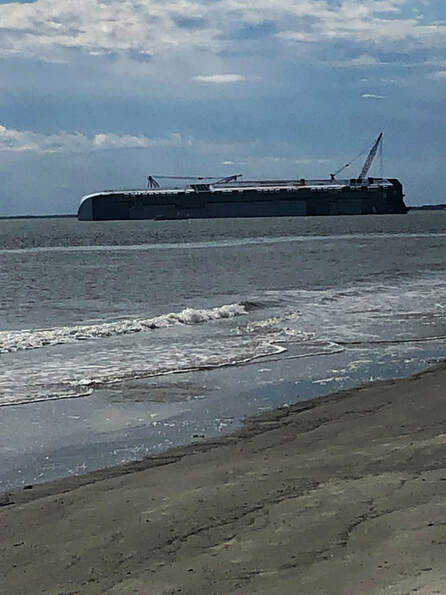 The Wreck of the Golden Ray, With its Cargo of Brand New Automobiles, Clutters the Georgia Coast The Wreck of the Golden Ray, With its Cargo of Brand New Automobiles, Clutters the Georgia Coast Sam Burnham, Curator The Corona Virus (COVID-19) is the new panic that is sweeping the planet. While narratives range from this being the common cold to it becoming a global pandemic causing the end of all life on Earth. The important story is not really about the disease itself. The important story is going to be buried because it doesn't fit nicely into the modern narrative. The important lesson here is about globalism and the dangerous place it has carried us. Let me start by saying that trade is not our enemy. Pure isolationism is not the answer to all of our problems, including the Corona Virus. Trade, when engaged properly, is a good thing. It adds variety to our economy and opens new markets for our products as well as provides us with products we might otherwise never see. Healthy trade benefits the economies and citizens of all the nations involved. But an honest glimpse at Southern history gives us a story of mismanaged trade. In the antebellum South almost all manufactured goods were foreign-made or at least made outside the South. As late as 1889, when Henry Grady addressed the Bay State Club of Boston, the situation had not changed much. His comments about attending a funeral in Pickens County related the fact that Georgia had plentiful resources but very few manufactured goods. Items needed for the funeral were all brought in from the cities of the North. "The South didn't furnish a thing on earth for that funeral but the corpse and the hole in the ground." Grady's point showed a hole in the Southern economy. Something was seriously missing. Balance is important and I certainly am not calling for Grady's New South or suggesting that the South look to heavy industry to solve its problems. Trade helps create a balance. Industrial centers can trade with resource centers and both can benefit. But balance is key.With too much reliance on industry we risk damaging the very resources we rely on and even altering our culture. With too little industry we become dependent on other locations to provide us with manufactured goods. This very morning (2/28/20) I heard from a health specialist appearing on the radio program 1A that between 80-90% of the ingredients for American generic pharmaceuticals are produced in China. So when there is an upheaval in China such as the Corona Virus or, God forbid, they go to war with us, our ability to produce medicine screeches to a halt. Keep an eye on the news, not for the stories designed to stir fear to drive ratings, but for the side effects. Notice all the products that are affected by the slowing of economic productivity in China. Well-balanced, healthy trade does not do this. Too many eggs in one basket does. Too few eggs in our own basket does. Again, balance. While we cannot possibly produce everything we need locally, the more we do produce locally, the more balanced our economy will be. There is certainly no excuse for any foreign nation to be producing 90% of anything as vital as medication. We have to produce more of this in our own country. Entrusting entire segments of the economy to other nations while merely assuming they will stay productive, stable, and solvent is a recipe for disaster. As China remains in quarantine and their productivity continues to drop, domestic businesses reliant on that productivity continue to suffer and our stock markets will continue to drop as a result. It is ridiculous that nations with smaller economies than ours drag our markets over their epidemics. We've benefited from cheap Chinese production but now we're paying the price for that. We'll survive this and they will to. But if we don't change the way we do things the next pandemic will just put us back in this same spot. Anything we do produce locally - food, clothing, furniture, electricity, you name it - will be independent of the downturns elsewhere. This is economic strength that we can build ourselves. We can build our local economies, improving the loves of our friends and neighbors, insuring economic security in hard times, and keeping our needs from being capsized in ships on our shores. A productive local economy is good for us, our neighbors, future generations, our local environment, and our planet. When you are in the market to purchase something, put a higher value on things that are produced locally, in your state, or in your region. Value should matter more than cost. Local products may cost more but they will usually be of a higher quality and will have a give more economic benefit to your local economy. Reward makers who are working to provide us with these options. Like I said, it won't always work. There are things we must import but you might be surprised at how much you can find that was made just down the street.
0 Comments
Leave a Reply. |
Sam B.Historian, self-proclaimed gentleman, agrarian-at-heart, & curator extraordinaire Social MediaCategories
All
Archives
November 2022
|




 RSS Feed
RSS Feed
